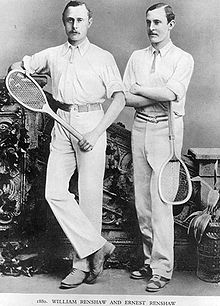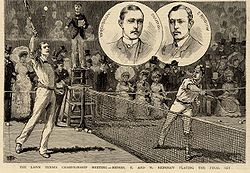
William Renshaw
Background to the schools Wikipedia
The articles in this Schools selection have been arranged by curriculum topic thanks to SOS Children volunteers. All children available for child sponsorship from SOS Children are looked after in a family home by the charity. Read more...
 William (L) and Ernest (R) Renshaw
|
|
| Full name | William Charles Renshaw |
|---|---|
| Country | |
| Born | January 3, 1861 Leamington, Warwickshire, United Kingdom |
| Died | August 2, 1904 (aged 43) Swanage, Dorset |
| Height | 1.77 m (5 ft 10 in) |
| Plays | Right-handed (1-handed backhand) |
| Singles | |
| Career record | 61-15 |
| Career titles | 17 |
| Highest ranking | No. 1 (1881) |
| Grand Slam Singles results | |
| Wimbledon | W ( 1881, 1882, 1883, 1884, 1885, 1886, 1889) |
| Doubles | |
| Grand Slam Doubles results | |
| Wimbledon | W (1884, 1885, 1886, 1888, 1889) |
William "Willie" Charles Renshaw (3 January 1861 in Leamington, Warwickshire – 12 August 1904 in Swanage, Dorset) was a former World No. 1 British male tennis player active during the late 19th century. He was one of the most successful male players in the history of the Wimbledon Championships. The right-hander was known for his power and technical ability which put him ahead of competition at the time.
Career
He won a total of twelve Wimbledon titles. Seven of those were in singles, an all-time record he shares with Pete Sampras and Roger Federer. The first six were consecutive, an achievement which has been unequaled to this day (although the five successive wins of Björn Borg and Roger Federer are considered the 'modern' record because in Renshaw's time the reigning champion had automatic entry to next year's final. Since 1922 the reigning champions have had to play in the main draw, making such feats considerably more difficult). In the Summer months he would compete in England and Ireland, while competing on the French Riviera during the winter months and practising on a private tennis court he and his brother had built at their own cost. In singles play he played his twin brother Ernest Renshaw three times (1882, 1883 and 1889) in the Wimbledon final, triumphing on all three occasions. The other five titles were in the Gentlemans' doubles, partnering with Ernest. Additionally, he and his brother dominated the sport for many years in a time when the only other Grand Slam was the US Open, and by custom players did not travel far. The rise in popularity of tennis in this period became known as the 'Renshaw Rush'. In 1888 William was elected the first president of the British Lawn Tennis Association (LTA). In 1983, William Renshaw was elected posthumously into the International Tennis Hall of Fame together with his brother.
Grand Slam finals
Singles (8)
Wins (7)
| Year | Championship | Opponent in Final | Score in Final |
| 1881 | Wimbledon | 6–0, 6–1, 6–1 | |
| 1882 | Wimbledon (2) | 6–1, 2–6, 4–6, 6–2, 6–2 | |
| 1883 | Wimbledon (3) | 2–6, 6–3, 6–3, 4–6, 6–3 | |
| 1884 | Wimbledon (4) | 6–0, 6–4, 9–7 | |
| 1885 | Wimbledon (5) | 7–5, 6–2, 4–6, 7–5 | |
| 1886 | Wimbledon (6) | 6–0, 5–7, 6–3, 6–4 | |
| 1889 | Wimbledon (7) | 7–5, 6–2, 4–6, 7–5 |
Runner-ups (1)
| Year | Championship | Opponent in Final | Score in Final |
| 1890 | Wimbledon | 6–8, 6–2, 3–6, 6–1, 6–1 |
Doubles (5)
Wins (5)
| Year | Tournament | Partner | Opponent in the final | Score in the final |
| 1884 | Wimbledon | 6–3, 6–1, 1-6, 6-4 | ||
| 1885 | Wimbledon (2) | 6–3, 6–3, 10-8 | ||
| 1886 | Wimbledon (3) | 6–3, 6–3, 4-6, 7-5 | ||
| 1888 | Wimbledon (4) | 2-6, 1-6, 6-3, 6-4, 6-3 | ||
| 1889 | Wimbledon (5) | 6–4, 6–4, 3-6, 0-6, 6-1 |
Grand Slam record
Wimbledon
- Singles champion: 1881, 1882, 1883, 1884, 1885, 1886, 1889
- Singles finalist: 1890
- Doubles champion: 1884, 1885, 1886, 1888, 1889

